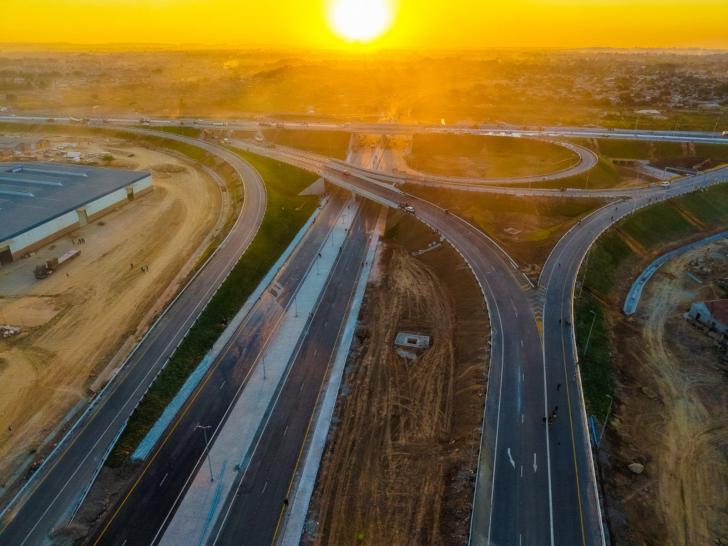News / National
Trabablas Interchange scandal deepens
11 hrs ago | Views

The cost of constructing the controversial Trabablas Traffic Interchange in Harare has surged to US$114 million, sparking a storm in Parliament amid growing concerns over fiscal transparency and potential corruption. Finance Minister Mthuli Ncube revealed the updated figure during a heated question-and-answer session, confirming that the project suffered a budget overrun of US$26 million beyond the initially declared US$88 million.
Ncube explained that the project was financed through a vendor loan arrangement with Fossil Mines, a company owned by Obey Chimuka, a known business associate of controversial tycoon Kudakwashe Tagwirei. He admitted that US$26 million used to cover part of the construction was drawn from Zimbabwe's allocation of Special Drawing Rights (SDRs) received from the International Monetary Fund (IMF) in 2021. The SDRs, amounting to approximately US$958 million, were intended to support Zimbabwe's post-COVID recovery and boost infrastructure development.
Responding to questions from CCC MP Discent Collins Bajila, Ncube said the US$26 million SDRs payment was used as a deposit, while the rest of the funding came from the contractor's loan. He insisted that the final product was a world-class infrastructure development and money well spent. However, lawmakers expressed outrage, arguing that government had not sought parliamentary approval for the additional funds and raised red flags about possible corruption and overpricing.
Dangamvura-Chikanga MP Prosper Mutseyami asked what had caused the additional US$26 million in costs, insisting that such expenses should have been accounted for in the initial project plan. Chinhoyi MP Leslie Mhangwa, who is an engineer by profession, criticized the explanation, saying cost escalations of this magnitude were unjustifiable and pointed to poor project planning or deliberate mismanagement.
In defense, Ncube said the overrun stemmed from unexpected costs, particularly the high compensation demands from property owners displaced by the project. He described these relocation expenses as unpredictable and unavoidable, claiming that such overruns were common in large infrastructure developments. He told Parliament that the US$88 million covered the core engineering work, including roads, drainage systems, bridges, signage, and electrical installations, while the extra US$26 million catered specifically for relocation and compensation.
Attempting to reassure MPs, Ncube broke down the costs, stating that the majority of the funds went into actual construction, while relocation expenses were only realized during implementation. He maintained that these were not irregularities but normal adjustments required during major urban development projects.
Despite his explanations, MPs questioned the accountability of SDR funds and the transparency of the vendor financing model. Critics believe the US$26 million overrun may have been used to facilitate bribes, kickbacks, and inflated compensation deals involving politically connected individuals. The use of IMF funds without clear oversight has further inflamed suspicions.
The Trabablas Interchange, once hailed as a flagship infrastructure initiative under the Second Republic, is now under intense scrutiny, with civil society groups and opposition legislators calling for an independent forensic audit. The latest revelations come at a time when government spending is under the spotlight, and pressure is mounting for better governance, fiscal discipline, and protection of public resources.
Ncube explained that the project was financed through a vendor loan arrangement with Fossil Mines, a company owned by Obey Chimuka, a known business associate of controversial tycoon Kudakwashe Tagwirei. He admitted that US$26 million used to cover part of the construction was drawn from Zimbabwe's allocation of Special Drawing Rights (SDRs) received from the International Monetary Fund (IMF) in 2021. The SDRs, amounting to approximately US$958 million, were intended to support Zimbabwe's post-COVID recovery and boost infrastructure development.
Responding to questions from CCC MP Discent Collins Bajila, Ncube said the US$26 million SDRs payment was used as a deposit, while the rest of the funding came from the contractor's loan. He insisted that the final product was a world-class infrastructure development and money well spent. However, lawmakers expressed outrage, arguing that government had not sought parliamentary approval for the additional funds and raised red flags about possible corruption and overpricing.
Dangamvura-Chikanga MP Prosper Mutseyami asked what had caused the additional US$26 million in costs, insisting that such expenses should have been accounted for in the initial project plan. Chinhoyi MP Leslie Mhangwa, who is an engineer by profession, criticized the explanation, saying cost escalations of this magnitude were unjustifiable and pointed to poor project planning or deliberate mismanagement.
Attempting to reassure MPs, Ncube broke down the costs, stating that the majority of the funds went into actual construction, while relocation expenses were only realized during implementation. He maintained that these were not irregularities but normal adjustments required during major urban development projects.
Despite his explanations, MPs questioned the accountability of SDR funds and the transparency of the vendor financing model. Critics believe the US$26 million overrun may have been used to facilitate bribes, kickbacks, and inflated compensation deals involving politically connected individuals. The use of IMF funds without clear oversight has further inflamed suspicions.
The Trabablas Interchange, once hailed as a flagship infrastructure initiative under the Second Republic, is now under intense scrutiny, with civil society groups and opposition legislators calling for an independent forensic audit. The latest revelations come at a time when government spending is under the spotlight, and pressure is mounting for better governance, fiscal discipline, and protection of public resources.
Source - online





































